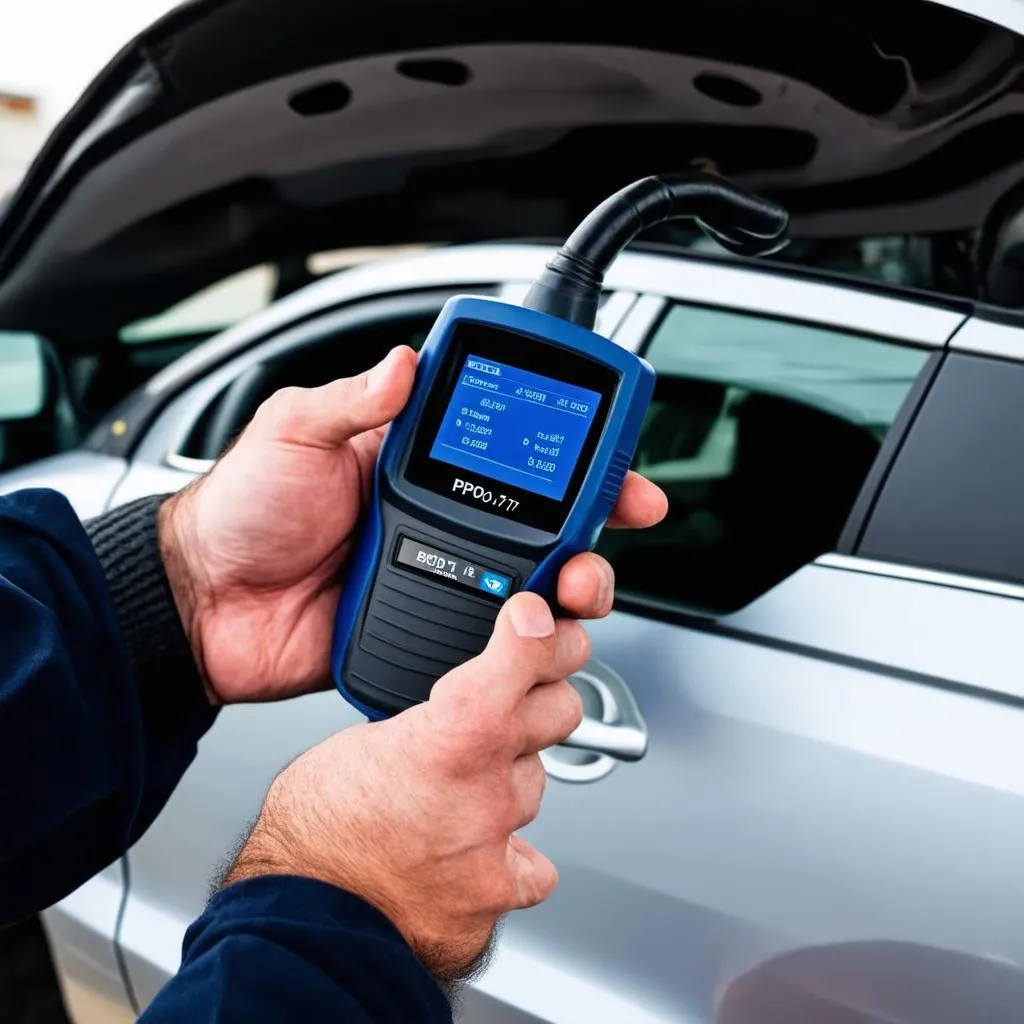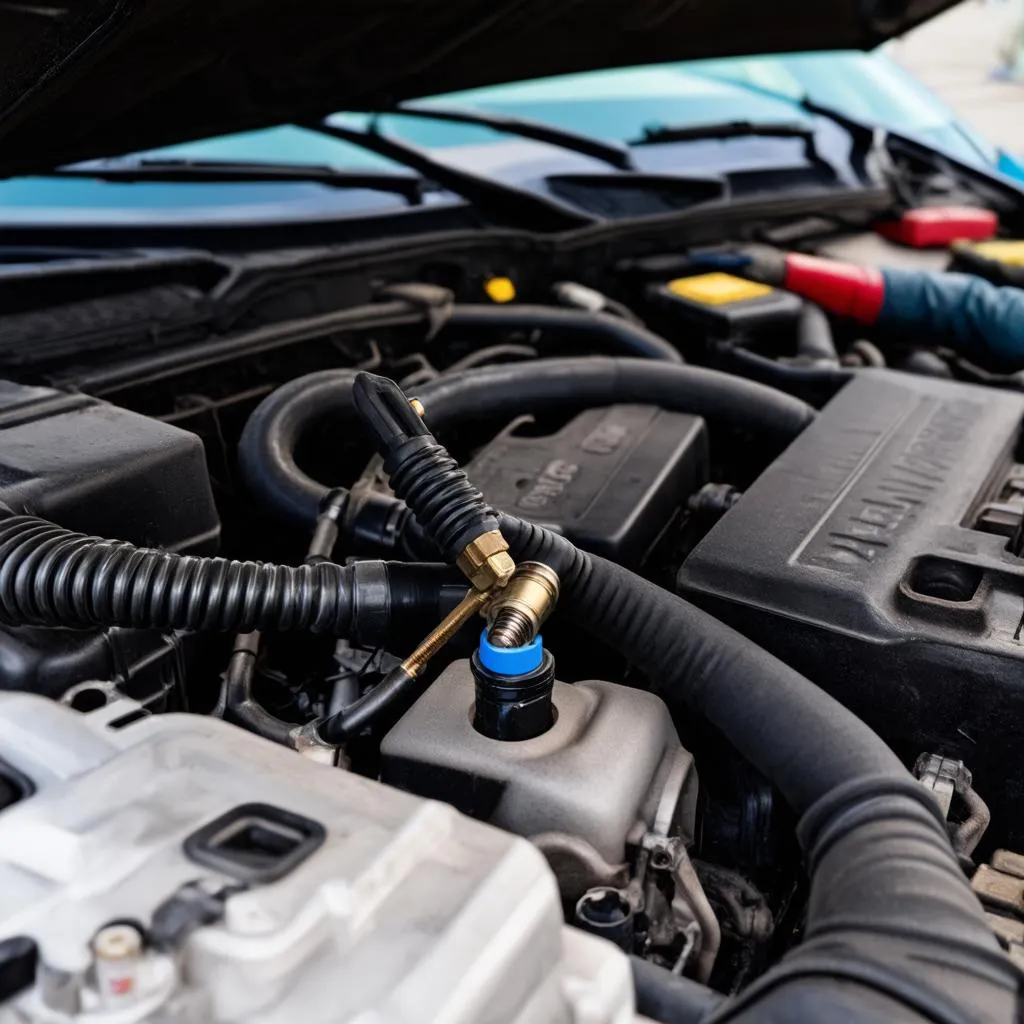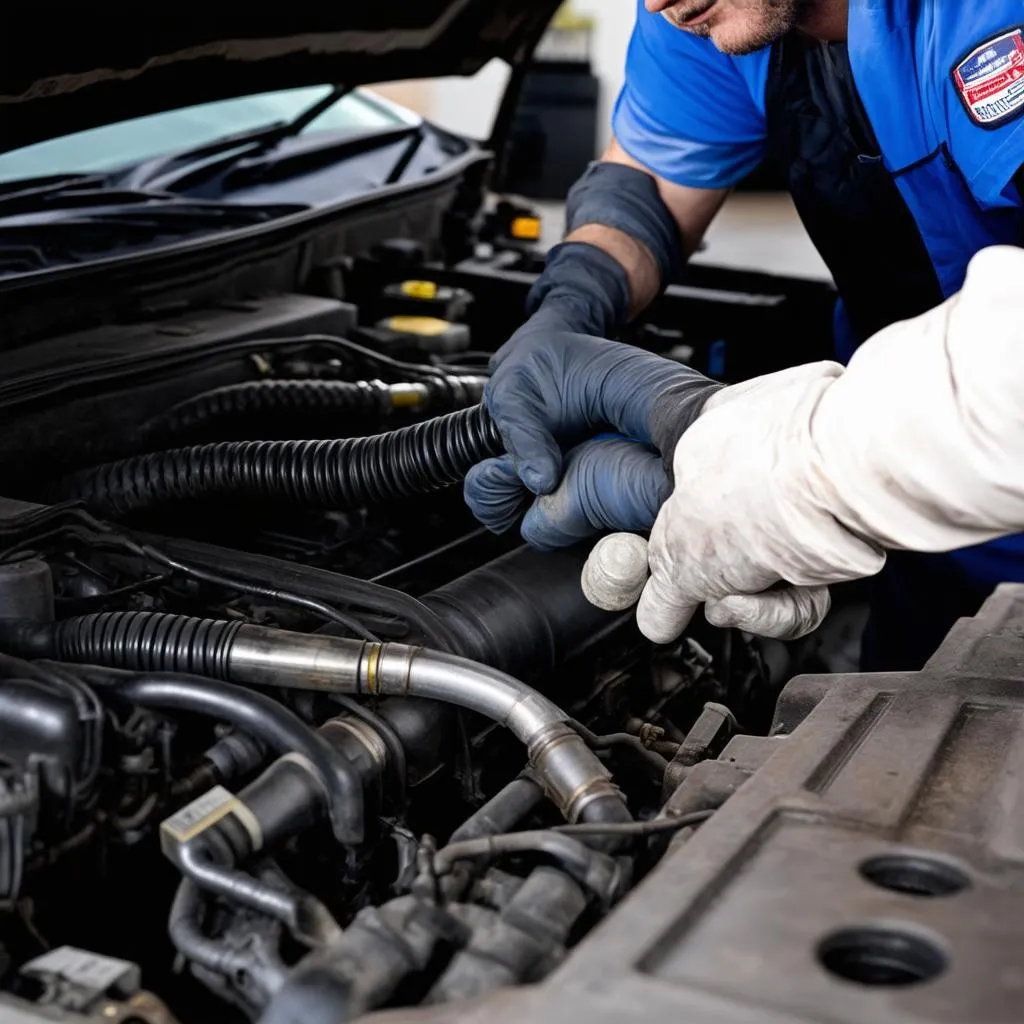Have you ever felt a sinking feeling in your gut when your car’s check engine light illuminates? It’s like a little voice whispering, “Something’s not right.” And when you plug in your OBD2 scanner, the dreaded P0171 code flashes across the screen.
While the code itself might seem like an enigma, it’s actually a signal that your car’s brain, the engine control module (ECM), is struggling to maintain the perfect balance of air and fuel in the engine. This can lead to a variety of issues, from reduced fuel efficiency to a rough idle.
Understanding The Significance of OBD Code P0171
The P0171 Obd code is a universal code indicating a “System Too Lean (Bank 1).” This essentially means that the air-fuel mixture entering your engine is too lean, meaning there’s too much air and not enough fuel.
Different Perspectives on P0171
From a Mechanic’s Perspective: The P0171 code often points to a faulty oxygen sensor, a leaking vacuum hose, or a problem with the fuel injectors.
From a Technical Perspective: The engine control module (ECM) relies on the oxygen sensor to monitor the air-fuel mixture. If the sensor detects a lean condition, it sends a signal to the ECM to adjust the fuel flow. However, if the ECM continues to receive a lean signal despite adjustments, it triggers the P0171 code.
From an Economic Perspective: A lean condition can lead to poor fuel economy, and in severe cases, damage to your engine.
From a Feng Shui Perspective: A car’s engine is often seen as the heart of the vehicle. An imbalance in the air-fuel mixture can be interpreted as a disruption in the car’s energy flow, impacting its overall performance and wellbeing.
Unveiling the Causes of P0171
Understanding the underlying reasons behind the P0171 code can help you diagnose the problem and take appropriate action.
Common Culprits:
- Faulty Oxygen Sensor: As the primary monitor of the air-fuel mixture, a malfunctioning oxygen sensor can lead to inaccurate readings, triggering a lean condition and the P0171 code.
- Vacuum Leak: A leak in the vacuum system can draw in excess air, upsetting the delicate air-fuel balance and causing the engine to run lean.
- Fuel Injector Problems: Clogged or faulty fuel injectors can hinder fuel delivery, resulting in a lean mixture.
- Air Intake Leak: A leak in the air intake system can introduce unmetered air, disrupting the air-fuel ratio and causing a lean condition.
- Faulty Mass Air Flow (MAF) Sensor: This sensor measures the amount of air entering the engine. A faulty MAF sensor can provide incorrect readings, leading to an improper air-fuel ratio and the P0171 code.
Troubleshooting and Solutions
It’s important to note that every vehicle is different, and the specific cause of the P0171 code may vary depending on the make, model, and year of your car. However, some general troubleshooting steps can help narrow down the problem:
Step 1: Inspect for visible leaks in the vacuum hoses and air intake system.
Step 2: Check the oxygen sensors, especially the one located before the catalytic converter.
Step 3: Test the fuel injectors for proper operation.
Step 4: Inspect the MAF sensor for dirt or damage.
Step 5: If you’re comfortable with mechanical work, consider replacing the faulty component yourself. Otherwise, it’s best to consult a qualified mechanic for diagnosis and repair.
Frequently Asked Questions
Q: Can I drive my car with a P0171 code?
A: It’s generally safe to drive your car with a P0171 code for a short period, but don’t ignore it. Continued driving with a lean condition can lead to damage to your engine.
Q: What are some other codes that may indicate a lean condition?
A: P0172, P0173, P0174, P0175, P0176, P0177, P0178, and P0179.
Q: What are the most common cars affected by the P0171 code?
A: While the P0171 code can affect any vehicle with an OBD2 system, some of the most common cars experiencing this issue include:
- Ford: (Ford F-150, Ford Escape, Ford Focus, Ford Mustang, Ford Taurus)
- Toyota: (Toyota Camry, Toyota Corolla, Toyota Tacoma, Toyota RAV4, Toyota Tundra)
- Honda: (Honda Civic, Honda Accord, Honda CR-V, Honda Pilot, Honda Odyssey)
- Chevrolet: (Chevrolet Silverado, Chevrolet Tahoe, Chevrolet Malibu, Chevrolet Cruze, Chevrolet Equinox)
Additional Resources and Support
For more in-depth information about the P0171 code and specific repair procedures for your vehicle, you can refer to your car’s owner’s manual, consult a reputable automotive repair manual, or visit online forums dedicated to your car’s model.
 obd-p0171-code-diagnosis
obd-p0171-code-diagnosis
 p0171-code-oxygen-sensor
p0171-code-oxygen-sensor
 p0171-code-vacuum-leak
p0171-code-vacuum-leak
Conclusion
While a P0171 code may seem daunting, it’s important to remember that it’s just a signal. With a little knowledge and the right tools, you can troubleshoot the problem and restore your car’s health. If you need expert assistance, don’t hesitate to reach out to a qualified mechanic. Remember, a well-balanced engine is the key to a smooth and enjoyable driving experience.
Feeling overwhelmed? We’re here to help! Our team of experts can assist you with diagnosing and resolving the P0171 code. Reach out to us on WhatsApp: +84767531508 for 24/7 support and expert guidance. Let’s get your car back on the road!
Do you have any other questions about the P0171 code or other automotive issues? Share them in the comments below!
We encourage you to explore other articles on our website for valuable information and insights on automotive repair and maintenance.
https://techcarusa.com/obd-171/
https://techcarusa.com/2001-toyota-corolla-obd-code-p0171/
https://techcarusa.com/2006-ford-freestar-p0171-and-p0174-obd/
https://techcarusa.com/audi-obd-code-p0171/
https://techcarusa.com/ford-obd-error-code-p0171/